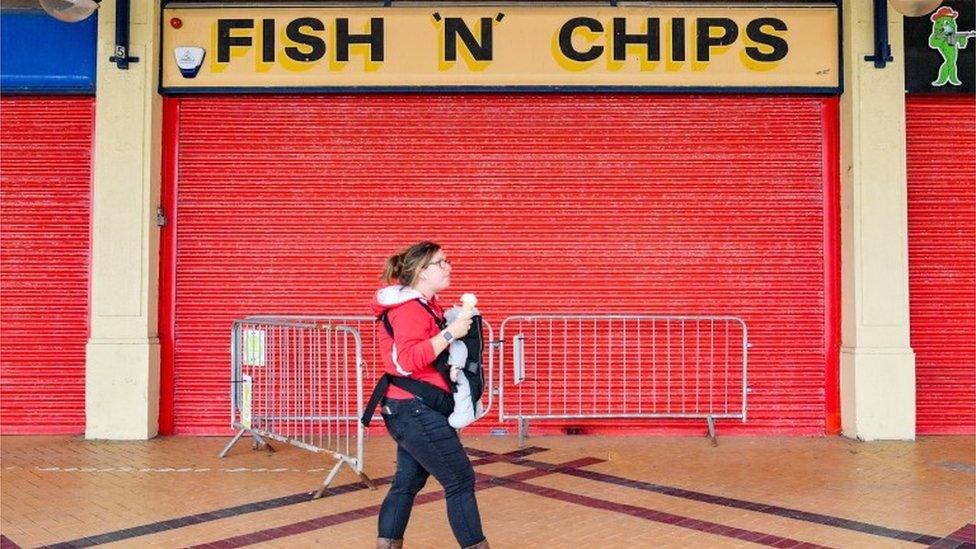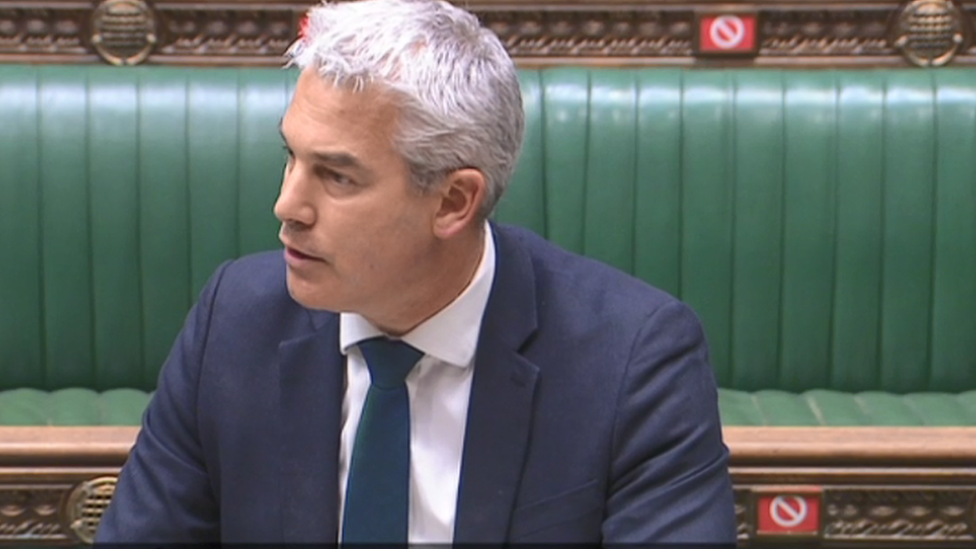Eviction ban on firms behind on rent is extended by nine months
- Published

A ban on landlords evicting firms for unpaid commercial rent is being extended for another nine months.
The ban, which stops landlords taking tenants to court for non-payment, was due to end on 30 June.
Treasury Secretary Stephen Barclay said the delay in easing lockdown restrictions, announced on Monday, "present additional challenges" to business.
It is estimated that firms in retail and hospitality are £5bn in rent debt.
While retailers and hospitality firms welcomed the measures, landlords voiced dismay and again warned that some profitable tenants were abusing the ban to avoid paying rent they can afford.
Mr Barclay told the Commons: "Existing measures will remain in place, including extending the current moratorium to protect commercial tenants from eviction to March 25, 2022," Mr Barclay told the Commons.
He also announced plans for a binding arbitration scheme to resolve disputes between landlords and commercial tenants. Mr Barclay said the scheme should be in place for when the eviction ban is lifted.
He said the measures "strike the right balance" between protecting landlords and supporting businesses most in need.
But Mr Barclay added: "To be clear, all tenants should start to pay rent again in accordance with the terms of their lease or as otherwise agreed with their landlord as soon as restrictions are removed on their sector if they are not already doing so."
Thousands of companies, especially in the hospitality sector, are still unable to trade normally, among them nightclubs and leisure firms.
In April last year the government blocked legal attempts to evict shops, restaurants and other businesses that had stopped paying rent, as part of emergency measures to soften the economic impact of the pandemic.

Mr Barclay told the Commons his measures "strike the right balance".
Hospitality leaders had called for an extension of the moratorium and for more financial support from the government.
On Monday, Prime Minister Boris Johnson said plans to remove remaining pandemic restrictions on 21 June have been pushed back to 19 July amid concerns over the spread of the Delta variant, which was first identified in India.
'Nick of time'
Last week, the chief executives of trade groups UK Hospitality and British Retail Consortium (BRC) told MPs that both sectors have accrued a combined £5bn in rent debt.
Data for the first quarter of 2021 shows that only 74% of rent was collected by landlords 60 days following the end of the period after tenants were battered by the pandemic.
Hospitality, leisure and retail operators have also benefited from a business rates holiday since the start of the crisis.
Helen Dickinson, chief executive of the British Retail Consortium, many of whose members have felt lockdown most acutely, said the extension comes "in the nick of time".
She said: "Just as retailers feared a wave of legal action by landlords, the government has stepped in to offer both landlords and tenants more time to negotiate. Retailers need time to trade their way out of debt; this announcement does exactly that."
'Abusing the system'
The Institute of Directors (IoD) also said firms across the country would welcome the extension, but the Treasury could have gone further.
Dr Roger Barker, the IoD's director of policy, said: "This is only one element of the cliff edge that we have been calling on government to address.
"At the end of this month businesses will still face the tapering off of furlough and business rates relief, and the suspension of wrongful trading liability. The government must hold its nerve and push out its business support measures until the job is properly done."
However, landlords were critical of the measures, with Melanie Leech, chief executive of the British Property Federation, saying: "The government has failed to recognise that commercial property owners are essential to the health of our town centres - to creating economic growth, jobs and opportunity."
She said the majority of property owners had already reached agreement with their tenants on rent, and millions of pounds have been provided to the most vulnerable tenants in the sectors most impacted by Covid-19. "That support will continue in light of the delay in the recovery roadmap for those businesses that need it," Ms Leach said.
"Another blanket extension to the moratoriums will provide further opportunity for those well-capitalised businesses who can afford to pay rent, but are refusing to do so, to continue their abuse of government and property owners' support and will cast a long shadow over future investment to build back better," she said.


Rent arrears time bomb
The ban on tenant evictions was just one of the government support measures that is due to start wearing off on 1 July. A business rate holiday will end with firms asked to pay 33% of their normal bill - rising to 100% by next March, while government contributions to furloughed staff wages will drop by 10% with employers making up the difference.
Extending these two measures would be very expensive for the government - extending an eviction ban costs it nothing - leaving the bomb in the lap of the landlord.
The government insisted the extension to March would allow new legislation to be drafted to create an arbitration system to resolve disputes between landlords and tenants.
Landlords big and small point out that they will have received no income from anyone who didn't want to pay (even if they could) for two years by next March. Support for them has largely come in the form of forbearance from their own banks whose patience may begin to run out.
Many also point out that the process of investment and repurposing commercial business premises for a post pandemic age will fall to them.
While many businesses will breathe a sigh of relief that landlord's knock at the door can be ignored for another nine months, someone will be left holding a rent arrears bomb - and the government is keen it's not them.
Related topics
- Published14 June 2021

- Published17 May 2021

- Published1 June 2021
